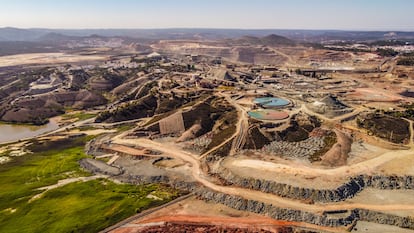Europe makes slow progress on critical minerals as US and China lead the way
In the last 30 years, Europe has outsourced its mining needs to other regions of the world, and has stopped looking for the resources it had right at home, experts say

A few days before returning to the White House as the new president of the United States, Donald Trump said, “We need Greenland for national security reasons.” His interest is no accident: the Danish island has abundant reserves of key minerals for the construction of almost any tech device. In the great global chessboard of critical minerals, China has the biggest advantage since it controls more than 90% of production; the US is fighting against all odds to gain some strategic autonomy, and Europe is doing what it can.
Luis Rodríguez Camino, a member of the executive committee of Euromines (the European Association of Mining Industries), believes that a very interesting decade lies ahead for the sector. “Mineral resources are back in the front line,” Rodriguez said during the Mining in the 21st Century conference, organized last month by Enerclub. “It is not enough to be local, we have to act like Europeans,” he insisted at the beginning of the conference. The challenge is to achieve independence in a context where most of the rare earth reserves are in China.
But something can be done. In January, the European Union brought forward the Critical Raw Materials Act, which aims to boost the development of the regional mining industry in order to improve strategic autonomy vis-à-vis third countries. It has targets with clear dates and simple percentages. By 2030, 10% of the annual demand for critical minerals must be met from within the EU. Among other targets, the region will not be able to import more than 65% of a mineral from a single country by the same year.
“In the last 30 years, Europe has outsourced its mining needs to other regions of the world, and has stopped looking for the resources it had right here,” Rodriguez complains. “The CRMA is a step forward, it’s a positive rather than a negative thing, and at the very least it has put on the table the need to look for critical minerals. Now we have a chance to get mining back on track,” he opines. Until now, the EU took it for granted that these minerals would continue to arrive with the same regularity as always.
“It’s not very clear to me why all mining projects generate rejection. People see a wind turbine, but they don’t think about the amount of rare earths needed to make it,” laments Méndez. To carry out the ecological transition demanded by society, it is necessary to build technology (solar panels, batteries, electric cars) that requires a huge amount of critical minerals that only other countries are capable of obtaining. “They are also there in many parts of Europe, but they have to be found and extracted,” he says, and that can take a long time. The intention, says Méndez, is to improve legislation and regulation of these processes to make them safe, but simpler.
Cesar Luaces Frades, secretary general of the Spanish group Cominroc (National Confederation of Extractive Industries of Rocks and Industrial Minerals), has a strong opinion about mining in Europe, in Spain, and the role that Trump is going to play in its development: “The Trump Administration is going to put enormous pressure on the sector, and Europe, with just about one regulation and four standards, is not going to get there in time. If Spain misses this train, it will never get back on it, and the same goes for Europe, and the problem is that I think we are doing everything we can to miss it.”
Sign up for our weekly newsletter to get more English-language news coverage from EL PAÍS USA Edition
Tu suscripción se está usando en otro dispositivo
¿Quieres añadir otro usuario a tu suscripción?
Si continúas leyendo en este dispositivo, no se podrá leer en el otro.
FlechaTu suscripción se está usando en otro dispositivo y solo puedes acceder a EL PAÍS desde un dispositivo a la vez.
Si quieres compartir tu cuenta, cambia tu suscripción a la modalidad Premium, así podrás añadir otro usuario. Cada uno accederá con su propia cuenta de email, lo que os permitirá personalizar vuestra experiencia en EL PAÍS.
¿Tienes una suscripción de empresa? Accede aquí para contratar más cuentas.
En el caso de no saber quién está usando tu cuenta, te recomendamos cambiar tu contraseña aquí.
Si decides continuar compartiendo tu cuenta, este mensaje se mostrará en tu dispositivo y en el de la otra persona que está usando tu cuenta de forma indefinida, afectando a tu experiencia de lectura. Puedes consultar aquí los términos y condiciones de la suscripción digital.









































